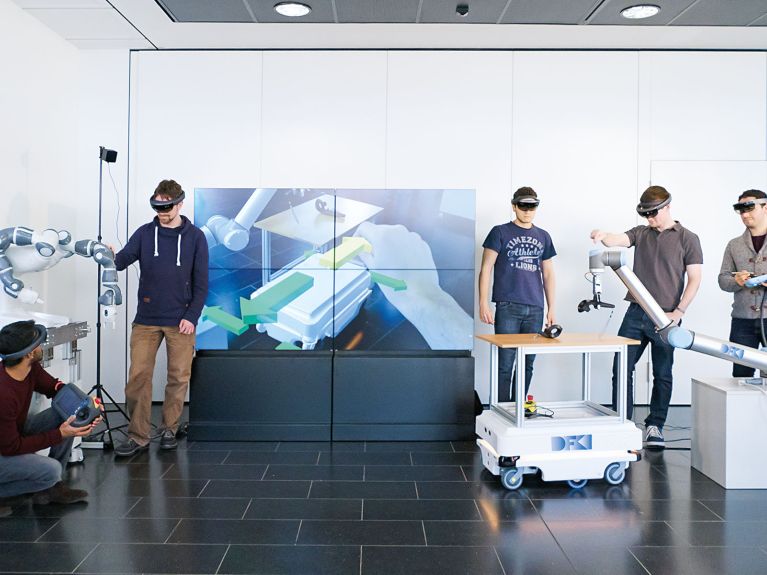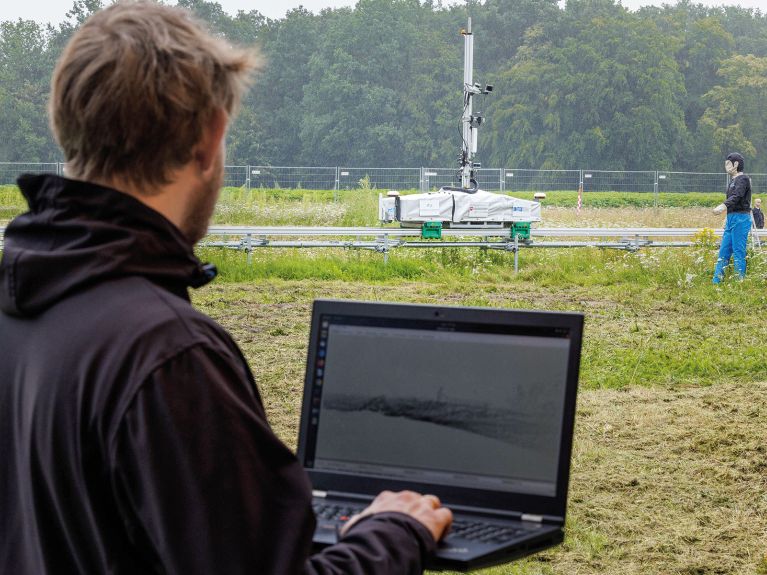Opportunities for AI talent
As a location for AI expertise, Germany has a lot to offer for a field whose importance is only set to grow in future, both in academia and business.

During a summer school in 2019 Richard Gao, a PhD student in the Department of Cognitive Science at the world-renowned University of California San Diego, got to know a group of German scientists from Tübingen. The team leader gave a talk on how artificial intelligence can be used in neuroscience research. Gao loved it. Then, when he had to choose where to continue his research as a Postdoc, he ultimately opted for the small university city near Stuttgart. “For a while now Tübingen has been known around the world as a top location for AI and neuroscience,” he tells us.
Gao has been a member of Professor Jakob Macke’s research group into machine learning in science at Tübingen’s AI Center since 2021. The tie-in between the University of Tübingen and the Max Planck Institute for Intelligent Systems is part of a nationwide network which currently consists of six AI research hotspots. The Federal Government wants to use these as part of its AI strategy to raise the profile of German AI research. The government’s stated goal is to encourage AI professionals from around the world to make a career in Germany. This goal not only applies to undergraduate and postgraduate students, but also at the level of university professors, where an additional 150 jobs have been planned.
Top talent from abroad
The Tübingen AI Centre has become an established address and is considered as one of Europe's strongest research clusters in the field of machine learning. “We now have a whole host of very high-calibre research scientists here who have come to us from top institutes abroad,” explains Philipp Hennig, Professor of Methods of Machine Learning at the University of Tübingen. “Many of the best international students are often in the position to choose whichever leading university they want to go to, so that can be a reason for some of them to come to us.”

Varied AI research
While the Tübingen AI Center focuses on developing so-called ‘robust learning systems’ or learning algorithms which can successfully deal with unexpected external influences, the five other competence centres each are focusing on a different aspect of AI research. The centre which takes the broadest approach is the German Research Center for Artificial Intelligence, which has sites in Kaiserslautern, Saarbrücken, Bremen and Berlin. Research scientists from 60 countries work there on a wide range of application cases for AI. The Munich School of Robotics and Machine Intelligence is working on the areas of work, health and mobility and is researching new approaches to human-machine interaction.
Scientists at the Berlin Institute for the Foundations of Learning and Data (BIFOLD) are particularly interested in the question of how to design complex AI systems in a more transparent way. “This is one of the essential conditions for the level of trust we can place in these systems, and ultimately for the success they enjoy in the market,” explains Dr Jack Thoms, Managing Director at BIFOLD. The Center for Scalable Data Analytics and Artificial Intelligence Dresden/Leipzig is concentrating on how to create new computer infrastructure which can process data more efficiently. The sixth AI centre in the consortium is the LAMARR Institute at the Fraunhofer Institute for Intelligent Analysis and Information Systems in Sankt Augustin near Bonn, which is digging into strategies to transfer research into business.
AI in the economy
Transferring research into practice is something where more and more German companies are making a significant contribution. Bosch, for example, has set up its own research department for AI, with around 100 AI research scientists working at their main office in Reutlingen near Stuttgart. “Every year we fund around 40 PhD students at German universities. They carry out their research right here with us and can use our resources,” explains Dr Michael Pfeiffer, head of AI research at Bosch. “Above all, outstanding AI research needs computing horsepower. As a business, we’re investing in that on a massive scale,” he says, adding that the investments are also paying off in terms of attracting skilled AI professionals. “We have a high rate of AI experts who stay on with us after completing their PhDs,” Pfeiffer says.
But Bosch is not alone in investing in training and skilled professionals. Innovation Park AI has only just opened in Heilbronn. The aim there is to use funding from the Schwarz food manufacturing group to create one of Europe’s largest AI ecosystems. Also involved in the project is Aleph Alpha, an AI startup from Heidelberg. It is one of the few European firms that can keep pace with the current leader among AI language models, ChatGPT from the US firm Open AI. Unlike its competitors, Aleph Alpha works with an AI system which produces results that are transparent to users. Transparency of this kind could prove to be a genuine innovative advantage, particularly for use at scale.

The Cologne-based AI company DeepL is also keeping up with international competitors. It offers an AI-based translation service which is considered more powerful and accurate than Google Translate, the comparable service from the US company. And DeepL has no trouble finding outstanding AI talent. According to their CEO Dr Jaroslaw Kutylowski, they benefit from the huge pool of skilled professions “right on our doorstep.” Just in the area around Cologne, there are 47 higher education institutions and 31 research institutions with 17,000 people studying IT subjects. Aleph Alpha is very happy to be in Heilbronn, too. “We’re in the ideal place here to increase our strength on the scientific side,” says Jonas Andrulis, founder of Aleph Alpha. Within the next 12 months he intends to double the company’s headcount to 120 people.
German Research Center for Artificial Intelligence
© www.deutschland.de